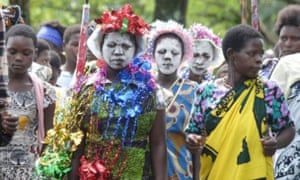In Kuria, public ceremonies celebrating the illegal season of female genital cutting have been allowed to take place unchallenged

Public ceremonies celebrating the illegal “season” of female genital mutilation (FGM) have been allowed to take place unchallenged by the authorities in some areas of Kenya, it has emerged.
Two campaigners in Migori county, close to the border with Tanzania, report that over the past month hundreds of girls belonging to the Kuria tribe have undergone FGM, and they witnessed groups of men, some armed, going door-to-door harassing the families of uncircumcised girls.
One of the campaigners, who has asked not to be named following threats of violence, said community leaders are breaking promises made only a few months ago to end the practice.
“Several high-level government officials dealing with FGM in Kenya visited Kuria on a few occasions this year, including from the national Anti-FGM Board,” he said. “Many village chiefs agreed to cooperate fully to ensure that no girl was cut.”
Ceremonies started secretly, he added, with some girls being taken in the early hours, but when they realised no action was being taken to stop them, it became full-blown and very public.
“The girls are being paraded openly in the streets, wearing the celebration hats as a sign, as the community members sing and dance on public roads in celebration. I have counted more than 100 girls in the past week alone.
“The  authorities have failed these girls. Many promises were made ahead of the cutting season, but police and law-enforcing authorities have not done enough.
authorities have failed these girls. Many promises were made ahead of the cutting season, but police and law-enforcing authorities have not done enough.
“Elders in this community are the worst enemies to ending FGM. They attend training but once they walk out, they are back to the practice. They have made FGM a business. They get allowances for meetings and when the cutters carry out FGM they take a share of the proceeds. The strategies used in Kuria need to change.”
Kurian people have one of the highest FGM rates in Kenya
FGM is a life-threatening procedure that involves the partial or total removal of the external genitalia. It has been banned in Kenya since 2011.
Nationally, the prevalence has dropped from 38% in 1998 to 21% in 2014, according to the latest Kenya demographic health survey published last year. Much work has been done in the past few years at government level, including the establishment of the national Anti-FGM Board, the introduction of a reporting hotline, a national roadshow programme and the formation of a team of 20 dedicated FGM prosecutors.
However, public ceremonies celebrating the illegal season of female genital cutting have been allowed to take place unchallenged by the authorities in some areas. There is no national programme to teach pupils about the long-term health implications. Many charities and NGOs work at grassroots level to engage with all members of the community.
But in some tribal areas, rates of FGM remain stubbornly high. Kurian people have one of the highest in Kenya – although it officially comes under Nyanza province, where the rate is about 33%, but this area includes tribes such as the Luo people who do not practise FGM.
Some campaigners are concerned that FGM has become a political matter, and with presidential elections scheduled for August 2017, FGM could drop off the agenda this season as politicians look to secure votes.
Feed the Minds, a charity championing women’s rights, which has worked exclusively in Kuria for six years, said there were varied reasons for some years to have an increased cutting season, which were deep-rooted in the culture. Its director, Josephine Carlsson, questioned the suggestion that increased cutting could be linked to one specific reason, such as an election year.
“Cutting doesn’t happen every year because there has to be good omens seen by the elders for it to take place. The rate fluctuates. FGM is linked to low literacy rates and early marriage; both are high in Kuria. There is economics involved, too. The bride price is higher for cut girls and it also increases a family’s status within their community.”
“People are more aware that it is illegal, but there is still much social pressure on families to have their daughters cut.”
The Foundation for Women’s Health, Research and Development (Forward), which works with Kurian people in Tanzania, warned earlier this year that because FGM is “unpopular” in years ending in seven, many were preparing girls to be cut before the end of 2016.
While there is obvious disappointment from campaigners about the continued and enforced FGM of girls, Katie Luxton, programme and funding manager for Feed the Minds, said what the statistics did not show was the change that had happened in people’s minds.
“We had a woman come to us with her two daughters asking for advice. This is a nice example of someone who is now questioning whether it should be done and looking for alternatives. It shows people are starting to become aware and question what they should do.
“Attitudes are changing, but so far on an individual basis. It’s very hard for an individual to resist a tradition that is so strong.”
©Alleastafrica and agencies



